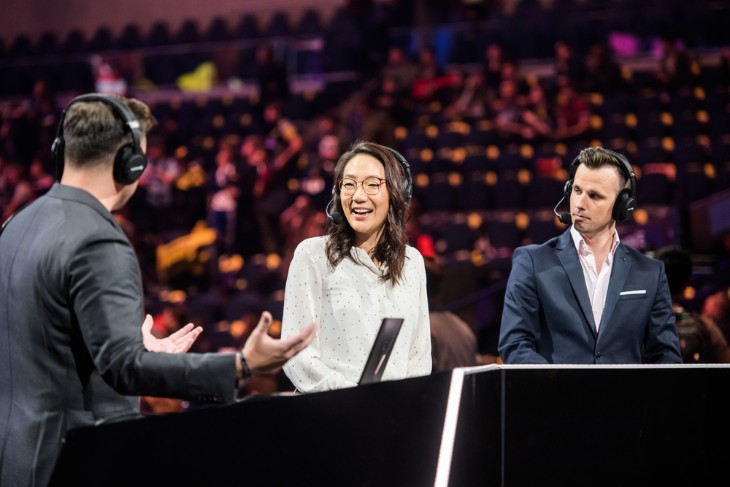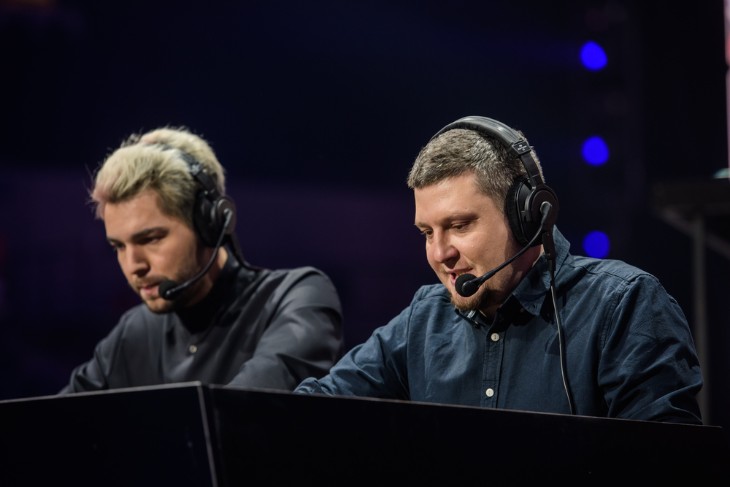- The Role and Importance of Snooker Commentators
- Factors Influencing the Earnings of Snooker Commentators
- Average Earnings of Snooker Commentators: An Overview
- Additional Income Sources for Snooker Commentators
- Navigating the Path to Becoming a Snooker Commentator
- Training and Skills Development for Aspiring Commentators
- Building a Career in Snooker Commentating: Opportunities and Challenges
- The Impact of Digital Media on Snooker Commentating
- The Future of Snooker Commentating: Trends and Predictions
- Enhancing Skills for Future-Ready Snooker Commentators
- Bottom Line
Snooker, a cue sport enjoyed globally, not only captivates players and fans but also involves a key component that enhances the viewing experience - the commentators. The voices behind the snooker matches bring life to the game, weaving narratives and insights that keep viewers engaged.
A common question that arises among enthusiasts and aspiring commentators alike is, "How much do snooker commentators get paid?" This article delves into the financial aspects of being a snooker commentator, exploring various factors that influence their earnings.
The Role and Importance of Snooker Commentators
Snooker commentators play a key role in how we enjoy snooker matches. They do more than just talk about the game. Their main job is to describe what's happening on the table. They tell us about the players' shots and strategies. This helps viewers, especially those new to snooker, understand the game better.
A big part of a commentator's job is to keep the audience interested. Snooker matches can be long. Good commentators know how to keep things exciting. They share fun facts, tell stories about players, and explain tricky rules. This makes the match more enjoyable for everyone.
Commentators also bring their personality to the game. Each one has a unique style. Some are funny, some are serious, and others are good at explaining technical details. This variety adds to the snooker experience. It makes every match feel different and fresh.
But their role isn't just about talking. Commentators do a lot of research. They learn about players, their past games, and their playing styles. This homework helps them give better insights during the match. They can predict plays, analyze strategies, and share background stories. This adds depth to the commentary.
Factors Influencing the Earnings of Snooker Commentators
Several things affect how much snooker commentators get paid. Here's a look at the main factors:
- Experience and Reputation: Experienced commentators usually earn more. If they're well-known and respected, they're likely to be paid higher. They have spent years building their skills and reputation. So, they're in demand and can ask for better pay.
- Type of Employment: How they work matters too. Full-time commentators often have a steady salary. Freelancers might earn more per event, but their income isn't as regular. Part-timers fall somewhere in between.
- Event Prestige: The bigger the event, the higher the pay. Commentators at top events like the World Snooker Championship can earn a lot. Smaller local tournaments usually pay less. Big events draw more viewers, so they have more money to pay commentators.
- Broadcasting Company: Who they work for also plays a role. Big sports networks often pay more than smaller companies. Larger networks have more viewers and more money, so they can offer better salaries.

Average Earnings of Snooker Commentators: An Overview
The earnings of snooker commentators can vary widely. For newcomers to the profession, the pay is usually on the lower end. They might earn a few hundred pounds for each event they cover. This is a modest start, but as they gain experience and recognition, their earning potential increases.
Experienced commentators, especially those with a well-established name in the snooker world, can expect significantly higher earnings. Their deep knowledge of the game, along with a strong fan following, makes them more valuable. These seasoned professionals can earn much more per event, sometimes reaching into the thousands, particularly for high-profile tournaments.
The biggest events in snooker, like the World Snooker Championship, often pay the highest rates to commentators. This is due to the large audiences these events attract and the prestige associated with them. Commentators working on such events can expect to earn the top end of the scale.
It's also worth noting that commentators' earnings are not solely based on the events they cover. Many supplement their income through related activities such as writing articles, making guest appearances, or offering expert analysis on various platforms. This can significantly boost their overall income.
Additional Income Sources for Snooker Commentators
Apart from their main job, snooker commentators often have other ways to earn money. One common way is through writing and journalism. Many commentators are knowledgeable about snooker and write articles for sports magazines or websites. This not only helps them share their expertise but also provides an additional source of income.
Another way commentators increase their earnings is through public speaking and making appearances at events. Those with experience and a good reputation in the snooker world are often invited to speak at sports events or host shows. These appearances can be quite lucrative and add significantly to their income.
Many commentators also use their deep understanding of snooker to offer coaching and consultancy services. They may work with snooker players to improve their game or advise sports companies on strategies related to snooker. This not only helps others in the sport but also provides a valuable income stream for the commentators.
Finally, some commentators expand their work into other areas of media. They might participate in radio shows, podcasts, or television programs related to snooker or sports in general. This diversification allows them to reach a wider audience and open up more opportunities for earning.
Navigating the Path to Becoming a Snooker Commentator
Becoming a snooker commentator starts with a deep love for the game. If you're passionate about snooker and want to share your insights, this could be a great path for you. Here are some steps to help you start this journey:
Firstly, it's crucial to learn as much as you can about snooker. This includes understanding the rules, knowing the players, and being familiar with the sport's history. The more knowledge you have, the more confidently you can talk about the game.
Next, practice your commentating skills. A good way to do this is by watching snooker matches and trying to commentate on them yourself. You can record your commentary and listen to it, which will help you identify areas for improvement. This practice will also help you develop your style of commentating.
Public speaking skills are vital for a commentator. You need to speak clearly and confidently. Consider joining a public speaking club or taking a course to improve these skills. Being able to communicate effectively will make your commentary more engaging and understandable.
Networking is another important step. Try to connect with people in the snooker world, including other commentators, players, and event organizers. Attend snooker events, if possible, and engage with the community. Building these connections can open up opportunities for you.
Lastly, start small. Look for opportunities to commentate at local or amateur snooker events. This experience is valuable and can lead to more significant opportunities. It's a chance to show your skills and build a reputation.
Training and Skills Development for Aspiring Commentators
For those looking to become snooker commentators, developing certain skills is essential. First, you need to know the game inside out. This means understanding the rules, strategies, and history of snooker. Watch lots of matches and learn about different playing styles and techniques.
Next, work on your speaking skills. A good commentator speaks clearly and keeps the audience engaged. Practice speaking out loud, focusing on clarity and keeping a steady pace. You could even record yourself and listen back to see how you sound.
It's also important to learn how to think on your feet. Snooker matches can be unpredictable, and you need to be able to comment on the action as it happens. Try practising with live matches, offering commentary in real time. This will help you get used to thinking and speaking quickly.
Another key skill is storytelling. Good commentators tell stories about players and matches that add to the viewing experience. Learn how to weave these stories into your commentary in a way that's interesting and relevant.
Lastly, technical knowledge is a big plus. Understanding the equipment used in snooker, like cues and tables, can add depth to your commentary. Spend some time learning about these aspects too.
Building a Career in Snooker Commentating: Opportunities and Challenges
Building a career in snooker commentating comes with its own set of opportunities and challenges. One big opportunity is getting to share your love for the game with others. As a commentator, you can turn your passion for snooker into a career. You also get the chance to meet other people who love snooker, including players and fans.
However, there are challenges too. One of the biggest is standing out in a competitive field. Many people want to be snooker commentators. To succeed, you need to work hard and be good at what you do. You also have to be patient. It can take time to get noticed and build a reputation.
Another challenge is keeping up with the sport. Snooker is always changing, with new players and strategies. A good commentator needs to stay up to date with all of this. This means constantly learning and adapting.
On the bright side, technology is creating new opportunities. For example, you can use social media to share your commentary and connect with fans. This can help you build a following and get more work.
The Impact of Digital Media on Snooker Commentating
Digital media has changed snooker commentating in many ways. One big change is how it has made commentating more accessible. Now, commentators can reach audiences all over the world through the internet. They use platforms like YouTube, podcasts, and social media to share their commentary. This helps them connect with more fans and grow their audience.
Another impact of digital media is the variety of formats it offers. Commentators are not just limited to live matches on TV. They can create different types of content, like match analyses, player interviews, and snooker tutorials. This variety keeps their work interesting and attracts different kinds of viewers.
Digital media also allows for more interaction with fans. Commentators can talk to fans directly through social media. They can answer questions, get feedback, and share behind-the-scenes stories. This interaction makes snooker more engaging for fans and helps commentators understand what their audience likes.
However, digital media also brings challenges. One is the need to keep content fresh and interesting. With so much content online, commentators need to be creative to stand out. They also have to be comfortable with technology, as they often create and edit their content.

The Future of Snooker Commentating: Trends and Predictions
The future of snooker commentating looks exciting with new trends shaping up. One big trend is the use of advanced technology. We might see more virtual reality (VR) and augmented reality (AR) in commentating. This means commentators could give viewers a more immersive experience, like feeling they're right at the snooker table.
Another trend is the growing global interest in snooker. This could lead to more opportunities for commentators. They might comment on matches from different parts of the world. This will help them reach new audiences and learn about snooker styles from various cultures.
We also predict that digital platforms will become even more important. Commentators who can use these platforms well will have an advantage. They'll be able to share their commentary in creative ways and interact more with fans.
A challenge for future commentators will be to keep up with these changes. They'll need to learn new technologies and adapt to different kinds of snooker playing styles. Staying updated and flexible will be key to their success.
Enhancing Skills for Future-Ready Snooker Commentators
To be ready for the future of snooker commentating, commentators need to keep enhancing their skills. Staying up-to-date with the latest technology is key. This means learning about new broadcasting tools like VR and AR. Being tech-savvy will help them create more engaging and immersive commentaries.
Understanding global trends in snooker is also important. Snooker is popular in many countries, each with its own style of play. Commentators should learn about these different styles. This knowledge will make their commentary more interesting to a global audience.
Improving communication skills is always important. Future commentators should work on speaking clearly and engagingly. They should also be good at storytelling. This makes their commentary more enjoyable for viewers.
Another skill to develop is adaptability. The world of snooker and media is always changing. Commentators need to be flexible and ready to adapt to new situations. This could mean commentating on different types of matches or using new media platforms.
Finally, building a strong online presence will be beneficial. Commentators should use social media and other digital platforms to share their work and connect with fans. This will help them build a following and stay relevant in the field.
Bottom Line
The journey of a snooker commentator is one of passion, dedication, and continuous growth. From understanding the nuances of the sport to adapting to the changing media landscape, it offers a unique blend of challenges and rewards.
As the sport of snooker evolves, so too will the role of the commentator, ensuring that this profession remains as dynamic and engaging as the game itself. For those with a deep love for snooker and a talent for communication, snooker commentating is not just a job, but a doorway to being an integral part of the exciting world of this beloved cue sport.
For more information:











